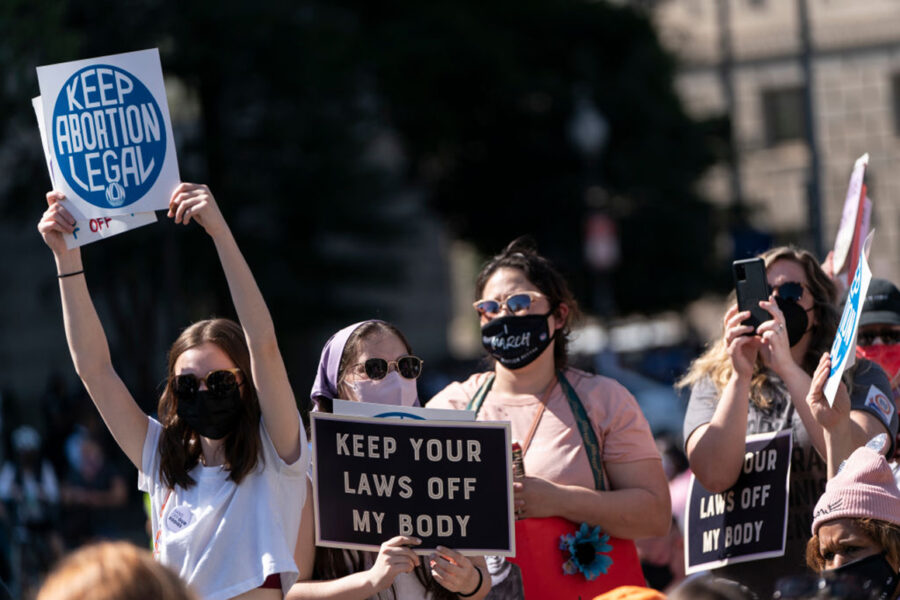Federal judge blocks enforcement of Texas abortion law

A federal judge has blocked the new Texas law that uses the prospect of private lawsuits to enforce a ban on abortions after about six weeks of pregnancy.
Acting on a suit brought by the Biden administration, U.S. District Court Judge Robert Pitman issued a preliminary injunction on Wednesday evening that immediately forbids Texas state court judges and clerks to accept suits under the law, known as S.B. 8.
“Despite the State’s attempts to obscure the question … people seeking abortions face irreparable harm when they are unable to access abortions; these individuals are entitled to access to abortions under the U.S. Constitution; S.B. 8 prevents access to abortion; a preliminary injunction will allow — at least for some subset of affected individuals — abortions to proceed that otherwise would not have,” Pitman wrote in his 113-page ruling.
The judge said he was particularly troubled by the design of the Texas statute, which was crafted to make it difficult for abortion rights advocates to challenge because of the lack of direct enforcement by state officials or prosecutors.
“Above all, it is the intentional design of the law by state actors for the chief purpose of avoiding judicial review that sets it apart — and makes it particularly likely to be appropriate for this Court to enjoin,” wrote Pitman, an appointee of President Barack Obama based in Austin, Texas.
The Justice Department praised the decision.
“Today’s ruling enjoining the Texas law is a victory for women in Texas and for the rule of law,” Attorney General Merrick Garland said in a statement. “It is the foremost responsibility of the Department of Justice to defend the Constitution. We will continue to protect constitutional rights against all who would seek to undermine them.”
Lawyers for Texas had asked Pitman to stay his ruling if he granted the federal request to enjoin the law, but he declined to allow such a delay.
“The State has forfeited the right to any such accommodation by pursuing an unprecedented and aggressive scheme to deprive its citizens of a significant and well-established constitutional right,” the judge wrote. “From the moment S.B. 8 went into effect, women have been unlawfully prevented from exercising control over their lives in ways that are protected by the Constitution.”
Within about an hour of Pitman releasing his decision, Texas filed a notice appealing the decision to the New Orleans-based 5th U.S. Circuit Court of Appeals, with the outcome of that appeal likely to wind up at the Supreme Court within weeks.
Abortion providers complained that the new law had dramatically curtailed the ability to have an abortion in Texas, even though the right to terminate a pregnancy has been protected by Supreme Court precedent for a nearly half a century.
Soon after the law took effect on Sept. 1, the Supreme Court voted, 5-4, to decline a bid by abortion providers to block it. However, the justices signaled doubts about the constitutionality of the so-called heartbeat law, which seeks to ban abortions performed after a fetus reaches six weeks of gestational age — when cardiac activity is typically detected. The high court also left open the possibility of further legal action.
The District Court ruling brings to an end the 36-day stretch in which nearly all abortions halted statewide for the first time since Roe vs. Wade was decided in 1973.
“We are hopeful that the court’s order blocking S.B. 8 will allow Texas abortion providers to resume services as soon as possible,” said Alexis McGill Johnson, the president and CEO of Planned Parenthood.
Yet some clinics might still be hesitant to resume offering abortions after six weeks of pregnancy, since a provision in the Texas law would allow them to be sued for abortions performed when an injunction is in effect if the law is later reinstated by a higher court.
“This block is temporary and we aren’t sure what this means for care yet,” said a spokesperson for Whole Woman’s Health, an organization that runs several abortion clinics in the state and took part in the lawsuit.
Wednesday’s decision might also scramble efforts in Florida, South Dakota and several other states to pass copycat laws.
Democrats on Capitol Hill celebrated the ruling but called for legislative action, pointing to the precarious state of abortion rights in the hands of a right-leaning Supreme Court that is set to revisit Roe vs. Wade in December. Should the high court decide after hearing a case from Mississippi in December that states can ban the procedure before the point of fetal viability, laws like the one in Texas will quickly proliferate.
“We can’t continue to rely on the whims of the courts in this fight,” said Rep. Diana DeGette (D-Col.), who co-leads Congress’ Pro-Choice Caucus.
DeGette and her colleagues are pushing the Senate to approve the Women’s Health Protection Act, a bill to impose federal protections for abortion access that narrowly passed the House last month and is currently awaiting a Senate vote that it is not expected to survive.
Part of Pitman’s decision to block a law he viewed as obviously unconstitutional read like a retort to the Supreme Court for failing to step in a little over a month ago when it first had the chance.
“That other courts may find a way to avoid this conclusion is theirs to decide; this Court will not sanction one more day of this offensive deprivation of such an important right,” Pitman wrote.
Go To Source
Author: POLITICO

